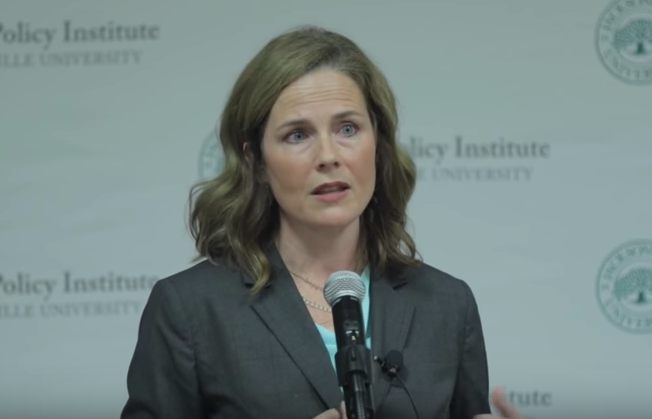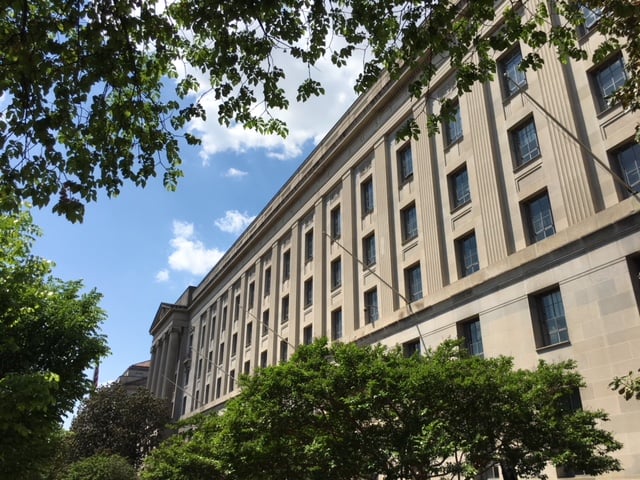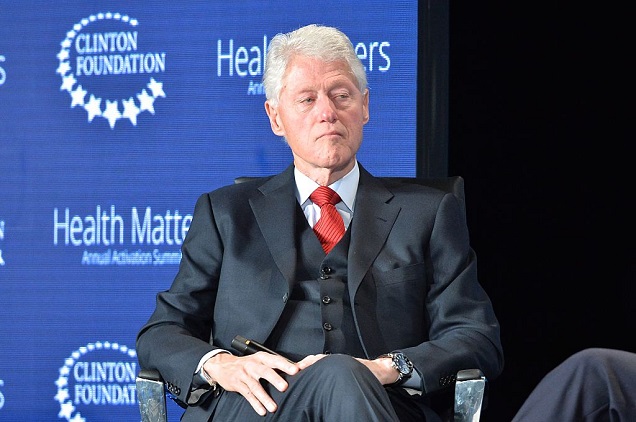
Law Professors Try To Defend Trump’s End To Birthright Citizenship. It Does Not Go Well For Them.
It's officially a pile on.

It's officially a pile on.

This complete system built for lawyers simplifies the complex world of law firm finance.

This is great advice in troubling times like these.

Right-leaning lawyers condemn the president.

* Adam Feldman poses -- and answers -- an interesting question: are particular justices more or less partial to certain lawyers' or law firms' positions? [Empirical SCOTUS] * Speaking of the federal judiciary, Carrie Severino offers this helpful scorecard of President Donald Trump's track record on judicial appointments -- which underscores, as she notes, the importance of the 2020 elections. [Bench Memos / National Review] * And speaking of President Trump, Joshua Matz and Laurence Tribe have this excellent explanation of why the Supreme Court does not have a role in adjudicating impeachments. [Take Care] * In the wake of the Mueller Report, Ilya Somin pushes back against conventional wisdom and takes this position: "Not all foreign interference in elections is unjustified. Far from it, in fact." [Volokh Conspiracy / Reason] * Fair use in the copyright context is an infamously amorphous concept -- so the Fourth Circuit's recent ruling in Brammer v. Violent Hues Productions deserves your attention. [All Rights Reserved] * Congratulations to Westlaw Edge, voted the "best new analytics product" by the readers of Dewey B Strategic. [Dewey B Strategic] * And congrats to Kira Systems on being picked by Bryan Cave Leighton Paisner as its AI solution for "high-volume workstreams" across the firm. [Artificial Lawyer] * If you're a libertarian-leaning lawyer with two to six years of experience under your belt, check out these great employment opportunities over at IJ. [Institute for Justice via Volokh Conspiracy / Reason]

* Where does Justice Brett Kavanaugh fit along the ideological spectrum at the Supreme Court? Adam Feldman evaluates the evidence thus far. [Empirical SCOTUS] * Speaking of SCOTUS, Frank Pasquale takes Neal Devins and Lawrence Baum's new book, The Company They Keep: How Partisan Divisions Came to the Supreme Court (affiliate link), as a jumping-off point for exploring the political polarization of SCOTUS. [Balkinization] * Texas v. Azar, the Obamacare case now pending before the Fifth Circuit, makes for unusual alliances -- how often do you see Jonathan Adler, Nick Bagley, Abbe Gluck, and Ilya Somin on the same amicus brief? [Take Care] * David Bernstein offers some thoughtful reflections -- with which I happen to agree -- on how some conservatives responded to the nominations of Neomi Rao and Jessie Liu. [Volokh Conspiracy / Reason] * Joel Cohen has a question about Robert Mueller: “What did he know, and when did he know it?” [The Hill] * And Cohen also has this interesting interview with Justice David Wecht of the Pennsylvania Supreme Court, about an important (and disturbing) subject: the recent rise in anti-Semitism, in America and abroad. [Tablet] * If you share my interest in litigation finance, then you might be interested in this great new resource: a comprehensive digital library of documents relating to the litigation-funding industry. [Litigation Finance Journal] * What trends and technology will shape the future of the legal profession? Jean O'Grady discusses highlights from a new report by Wolters Kluwer. [Dewey B Strategic]

Reach out to continue the conversation on how to most effectively detect, prevent, and correct this or other types of fraud, cybercrime, misconduct, and non-compliance.

* You wouldn't want to be in the shoes of Jussie Smollett right now -- nor the shoes of his lawyers, according to Joel Cohen and Dale Degenshein. [Law and Crime] * And in other celebrity legal news, the new documentary about Drake has triggered a slew of copyright claims and takedown notices. [All Rights Reserved] * If you've been listening to the compelling new podcast from Wondery about the Dan Markel case, check out this interesting interview with host Matt Shaer. [Uproxx] * Speaking of podcasts, I recently appeared on Miranda Warnings, the popular podcast by former New York State Bar Association president David Miranda, to talk about Biglaw, legal education, and more. [Miranda Warnings] * And if you'll be in Nashville tomorrow or Tuesday, please feel free to stop by either or both of the talks I'll be giving at Vanderbilt -- one on judicial celebrity, and one on the state of legal education. [Vanderbilt Federalist Society / Vanderbilt Law School Library] * If you're a libertarian or otherwise concerned about excessive exercises of government power, you should be concerned about President Donald Trump's invocation of emergency powers, as Ilya Somin explains. [Volokh Conspiracy / Reason] * Will the Supreme Court ride to Trump's rescue if and when his national emergency declaration winds up before SCOTUS? Brianne Gorod has her doubts. [Take Care] * More excellent advice from expert courtroom lawyer David Berg -- think of this as "The Trial Lawyer: What It Takes To Lose." [YouTube]

* Adam Feldman explores the possible effect on the Supreme Court of replacing Justice Ruth Bader Ginsburg with a staunch conservative -- e.g., Judge Amy Coney Barrett. [Empirical SCOTUS] * Speaking of SCOTUS, here's Ilya Somin's read of the tea leaves in Knick v. Township of Scott, an important Takings Clause case. [Volokh Conspiracy / Reason] * Stephen Embry disagrees with Joe Patrice's suggestion that junior lawyers are going extinct, but Embry acknowledges the major effect that technology is having, and will continue to have, on legal practice and employment. [TechLaw Crossroads] * Charles Glasser looks at what might have caused the political polarization of the modern media and its consumers. [Daily Caller] * The prospect of Michael Cohen testifying publicly before Congress is making some people giddy -- but it's not without its downsides, as Joel Cohen explains. [The Hill] * What can we learn from official Washington utterances about the shutdown? Here's some intel from VoxGov, via Jean O'Grady. [Dewey B Strategic] * Not all provisions of the Bill of Rights are created equal, according to Gerard Magliocca. [PrawfsBlawg] * David Berg draws lessons for trial lawyers from the genius of Joe Jamail's use of hypothetical questions. [YouTube]

* In 2018, what did Donald Trump talk about when he talked about the courts? Adam Feldman dives into the data to find out. [Empirical SCOTUS] * Speaking of President Trump and the judiciary, he continues to appoint federal judges at a record pace -- but the Democrats are doing everything they can to slow down his progress. [Bench Memos / National Review] * If you care at all about affordable housing, then you should be heartened by these developments in the fight against exclusionary zoning, as discussed by Ilya Somin. [Volokh Conspiracy / Reason] * Congratulations to the Department of Justice on its ninth consecutive year of civil health care fraud settlements and judgments exceeding $2 billion. [MedCity News] * If you're interested in the hot topics among law librarians, legal technologists, and others in the space, check out Jean O'Grady's most popular stories of 2018. [Dewey B Strategic] * And if you're interested in the year that was in artificial intelligence and the law, check out the Artificial Lawyer's roundup of notable news. [Artificial Lawyer] * Condolences to the friends, family, and colleagues of Bre Payton, who passed away last week at the age of 26. [The Federalist] * Veteran trial lawyer David Berg continues his series on "What It Takes To Win." [YouTube]

* What are expert advocates' secrets to cert success? Adam Feldman's very interesting analysis suggests that using certain buzzwords in a petition might help. [Empirical SCOTUS]
* Ilya Somin points out this fun depressing fact: one of the plants that General Motors will be closing sits on land seized in a controversial taking that forcibly displaced more than 4,000 people. [Reason / Volokh Conspiracy]
* The Third Circuit is poised to become the first (but probably not the last) circuit court to "flip" flip from a majority of Democratic appointees at the outset of the Trump administration to a majority of Republican appointees, as Ed Whelan notes. [National Review / Bench Memos]
* A June 3 trial date has been set for Sigfredo Garcia and Katherine Magbanua in the Dan Markel case -- almost five long years after Professor Markel's murder. [Tallahassee Democrat]
* In the wake of a recent tragedy, Neha Sampat offers some reflections on impostor syndrome in the legal profession. [ABA Journal]
* If you're a conservative or libertarian law student, you should consider attending the Federalist Society's 2019 National Student Symposium, with "The Resurgence of Economic Liberty" as its theme. [Federalist Society]
* Can the Supreme Court save our democracy? David Pozen opines (and he's not optimistic).

Facing growing caseloads and data volumes, law firms that rely on outdated case management tools risk falling behind. Discover how AI is transforming litigation processes and giving firms a competitive edge.

* A fun bit of trivia (via Adam Feldman): which Supreme Court justice cites law review articles most often? (Hint: he does so a lot in dissent.) [Empirical SCOTUS] * Charles Glasser argues that Senator Claire McCaskill -- who's in a tough reelection fight against a former SCOTUS clerk, Josh Hawley -- advocates a move that "represents a clear and present danger to investigative journalism." [Daily Caller] * It's helpful to Josh Hawley that President Donald Trump is so popular in Missouri -- even among women, interestingly enough. [Althouse] * Immigration law is a hot topic these days, thanks in large part to President Trump -- so it makes sense that Fastcase and the American Immigration Lawyers Association (AILA) are launching a new law journal focused on this interesting and complex area of law. [Dewey B Strategic] * Speaking of immigration, Ilya Somin refutes the argument that migrants should just stay home and "fix their own countries." [Volokh Conspiracy / Reason] * Who says bankruptcy lawyers and judges don't know how to have a good time? [Texas Bankruptcy Lawyer's Blog]

The professor thinks Cesar Sayoc's goal in threatening him may have been to 'intimidate and cause emotional pain.'

* Adam Feldman identifies eight issues where widely divergent state laws could lead to Supreme Court intervention. [Empirical SCOTUS] * Jonathan Adler wonders why it took so long for NBC to report on the inconsistencies and discrepancies in the allegations that Julie Swetnick made against Justice Brett Kavanaugh. [Bench Memos / National Review] * It seems that Cesar Sayoc didn't limit himself to threatening prominent liberals and progressives; he apparently went after Ilya Somin as well. [Reason / Volokh Conspiracy] * A riddle from Mark Lemley (via Orly Lobel): what's the "most Silicon Valley fact ever"? [PrawfsBlawg] * Congratulations to Bloomberg Law on the launch of its latest offering in litigation analytics. [Artificial Lawyer] * And congratulations to Fastcase on its latest deal, the acquisition of Law Street Media. [Dewey B Strategic]

* Are you paying too much in mutual-fund fees? If you're paying more than zero, then yes -- or so argue Professors William Birdthistle and Daniel Hemel in this interesting and persuasive op-ed. [Wall Street Journal] * James Comey, FBI director turned author (affiliate link), responds to the criticisms of him in the Inspector General's report. [Althouse] * It's complicated -- but just how complicated? Adam Feldman uses word counts and citations to measure opinion complexity during the current Term of the Supreme Court. [Empirical SCOTUS] * Judge Alex Kozinski (Ret.) pays tribute to the memory of his late colleague on the Ninth Circuit, Judge Stephen Reinhardt. [Concurring Opinions] * If you're confused by why the latest Obamacare litigation over the individual mandate matters, since the mandate was rendered toothless by the recent tax reform, Professor Ilya Somin can help. [Volokh Conspiracy / Reason] * Ethics expert Steven Lubet reviews Ryan Holiday's book (affiliate link) about the Hulk Hogan/Gawker case -- and argues that Peter Thiel's financing of the litigation might have violated legal ethics. [American Prospect via PrawfsBlawg] * Thomson Reuters, a leader in applying artificial intelligence in the law -- we're partnering with them on our Law2020 series, exploring how AI is affecting the legal profession -- also utilizes machine learning to help people trade cryptocurrencies (among many other use cases). [Artificial Lawyer]

* What changes might come to the Supreme Court if Justice Kennedy retires at the end of this Term? Adam Feldman scours the justices' voting relationships for clues. [Empirical SCOTUS] * Speaking of SCOTUS, when it comes to its recent ruling in Masterpiece Cakeshop, Andrew Siegel is not impressed. [PrawfsBlawg] * Ilya Somin offers praise for legislation being co-sponsored by Senator Elizabeth Warren -- but it will make sense to you once you see the subject matter (hint: her co-sponsor is Senator Cory Gardner of Colorado). [Volokh Conspiracy / Reason] * Charles Glasser has no problem with people calling out or criticizing speech that they find offensive, but he argues -- rightly so, in my view -- that we've lost "a sense of proportion, a rational relationship between the speaker, their comments, and their role in society." [Daily Caller] * Ann Althouse's take on Bill Clinton's controversial #MeToo comments. [Althouse] * Greg Lambert is absolutely right: "Sometimes the change you seek causes problems you didn’t foresee." [3 Geeks and a Law Blog] * Smart-contract checker Sagewise hooks up with Hedera Hashgraph, a "blazing fast" alternative to blockchain. [Artificial Lawyer]